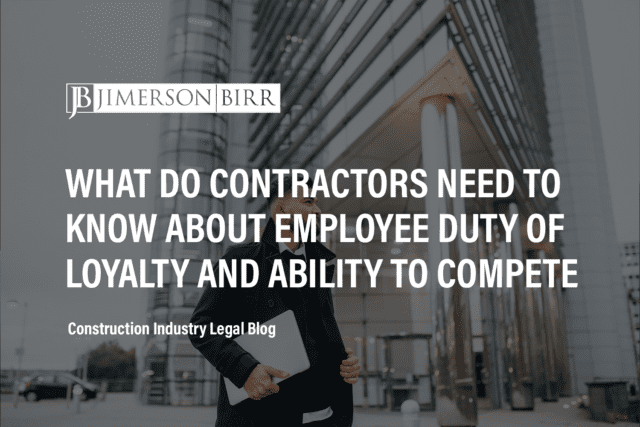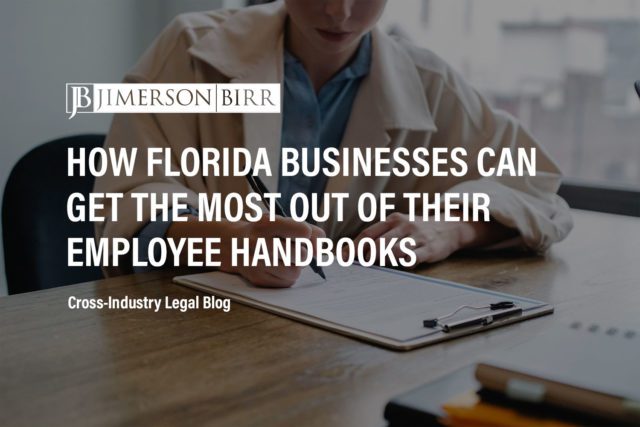How do state and local employment laws generally impact businesses?
Florida’s employment laws, like related federal employment laws, are intended to ensure fair treatment, protection of rights, and adherence to legal obligations within the workplace. Compliance with state and local regulations is vital for businesses to avoid costly penalties, lawsuits, and damage to their reputations.
Employer compliance with Florida’s various employment laws and regulations often comes down to the efficacy of employee training. Effective training programs are essential to ensure that employees understand their rights and responsibilities under the law. This fosters a culture of compliance and mitigates the risk of potential litigation. Moreover, businesses must stay updated on changes in legislation and proactively adjust their policies and practices to remain compliant.
Litigation in employment law matters can be complex and costly. Disputes may arise concerning issues such as wrongful termination, harassment, or wage disputes. Businesses must be prepared to defend their actions in court and seek legal counsel to navigate these challenges effectively.
Need help with a matter related to employment law? Schedule your consultation today with a top employment law attorney.
Which state and federal employment laws and regulations are crucial for ensuring compliance?
At the federal level, statutes such as Title VII of the Civil Rights Act of 1964, the Americans with Disabilities Act (ADA), the Fair Labor Standards Act (FLSA), and the Occupational Safety and Health Act (OSHA) establish foundational guidelines for employment practices nationwide. Each act is enforced by a federal agency, each with rules and regulations that further supplement these statutes.
Specific statutes and regulations in Florida further govern various aspects of employment law. For instance, the Florida Civil Rights Act prohibits discrimination based on race, color, religion, sex, pregnancy, national origin, age, disability, or marital status. The Florida Minimum Wage Act also sets forth requirements for minimum wage and overtime pay.
For the most part, Florida’s employment laws and regulations substantially reflect federal law. However, even though federal and state employment laws often parallel one another, there may be crucial differences in specific industries that employers must pay close attention to to structure effective compliance and training programs.
What are common issues regarding state and local employment law compliance or training that lead to litigation?
The following issues are among the most common in actions regarding state and local employment law compliance, training, or litigation in employment law matters:
- Discrimination Claims: Failure to adhere to anti-discrimination laws can lead to litigation. This includes discrimination based on race, gender, age, disability, or other protected characteristics.
- Wage and Hour Violations: Incorrect employee classification, failure to pay overtime, or failure to meet minimum wage requirements can result in lawsuits for wage and hour violations.
- Unsafe Workplace Conditions: Neglecting safety regulations outlined by OSHA or state laws may result in employee injuries or illnesses, which can lead to litigation.
- Wrongful Termination: Terminating employees without valid reasons or in violation of employment contracts or anti-discrimination laws can lead to wrongful termination claims.
- Harassment and Hostile Work Environment: Failure to address harassment complaints or foster a hostile work environment can result in legal action against the employer.
- Lack of Proper Documentation: Inadequate record-keeping regarding employment decisions, disciplinary actions, or accommodations can weaken the employer’s defense in litigation.
We are value-based attorneys at Jimerson Birr, which means we look at each action with our clients from the point of view of costs and benefits while reducing liability. Then, based on our client’s objectives, we chart a path forward to seek appropriate remedies.
To determine whether your unique situation may necessitate litigation, please contact our office to set up your initial consultation.
What practical steps should an employer take to minimize the risk of litigation over state and local employment law compliance and training?
To mitigate the risk of litigation over state and local employment law compliance, training, or litigation, businesses can implement the following strategies:
- Regular Compliance Audits: Conduct periodic audits to ensure compliance with all applicable employment laws and regulations at the state and federal levels.
- Comprehensive Employee Training: Provide thorough training to employees on their rights, responsibilities, and company policies regarding discrimination, harassment, safety, and other relevant areas.
- Clear Policies and Procedures: Establish clear and consistent policies and procedures regarding hiring, termination, wages, safety, and other employment matters, and ensure that employees understand and adhere to them.
- Effective Communication Channels: Maintain open communication channels for employees to promptly report concerns, complaints, or incidents and ensure that these are addressed promptly and appropriately.
- Documentation and Record-Keeping: Maintain accurate and detailed records of employment decisions, incidents, complaints, and training activities, as these can serve as crucial evidence in case of litigation.
- Consultation with Legal Experts: Seek guidance from legal experts specializing in employment law to ensure that policies, practices, and decisions align with legal requirements and best practices.
Frequently Asked Questions
Can an employer be liable for discrimination if a manager acts independently?
Yes, employers can be held vicariously liable for discriminatory actions of their employees, including managers, if the discrimination occurs within the scope of employment.
Is it necessary for employers to have written employment contracts with their employees?
While written contracts are not always required, they can clarify terms of employment, such as compensation, benefits, and expectations, reducing the risk of disputes.
Can employees sue for retaliation if they file a complaint against their employer?
Yes, employees are protected from retaliation for engaging in protected activities, such as filing complaints or investigating workplace violations.
Have more questions about a state and local employment law compliance, training, or litigation-related situation?
Crucially, this overview of state and local employment law compliance, training, and litigation does not begin to cover all the laws implicated by this issue or the factors that may compel the application of such laws. Every case is unique, and the laws can produce different outcomes depending on the individual circumstances.
Jimerson Birr attorneys guide our clients to help make informed decisions while ensuring their rights are respected and protected. Our lawyers are highly trained and experienced in the nuances of the law, so they can accurately interpret statutes and case law and holistically prepare individuals or companies for their legal endeavors. Through this intense personal investment and advocacy, our lawyers will help resolve the issue’s complicated legal problems efficiently and effectively.
Having a Jimerson Birr attorney on your side means securing a team of seasoned, multi-dimensional, cross-functional legal professionals. Whether it is a transaction, an operational issue, a regulatory challenge, or a contested legal predicament that may require court intervention, we remain a tireless advocate every step of the way. Being a value-added law firm means putting the client at the forefront of everything we do. We use our experience to help our clients navigate even the most complex problems and come out the other side triumphant.
If you want to understand your case, the merits of your claim or defense, potential monetary awards, or the amount of exposure you face, you should speak with a qualified Jimerson Birr lawyer. Our experienced team of attorneys is here to help. Call Jimerson Birr at (904) 389-0050 or use the contact form to set up a consultation.
Here are some blogs written by JB attorneys that provide more information about state and local employment law compliance, training, and litigation:
- Independent Contractor or Employee: Know the Difference
- Rescinding Job Offers in At-Will Employments in Florida
- Tips for Drafting Employee Handbooks in Florida
- Understanding The EEOC Process: Employee Sexual Harassment And Sexual Discrimination Claims In The Era Of #MeToo
- Contesting OSHA Violations and OSHA Citations: A Guide To OSHA Employer Rights
- What Do Contractors Need to Know About Employee Duty of Loyalty and Ability to Compete

We live by our 7 Superior Service Commitments
- Conferring Client-Defined Value
- Efficient and Cost-Effective
- Accessibility
- Delivering an Experience While Delivering Results
- Meaningful and Enduring Partnership
- Exceptional Communication Based Upon Listening
- Accountability to Goals











